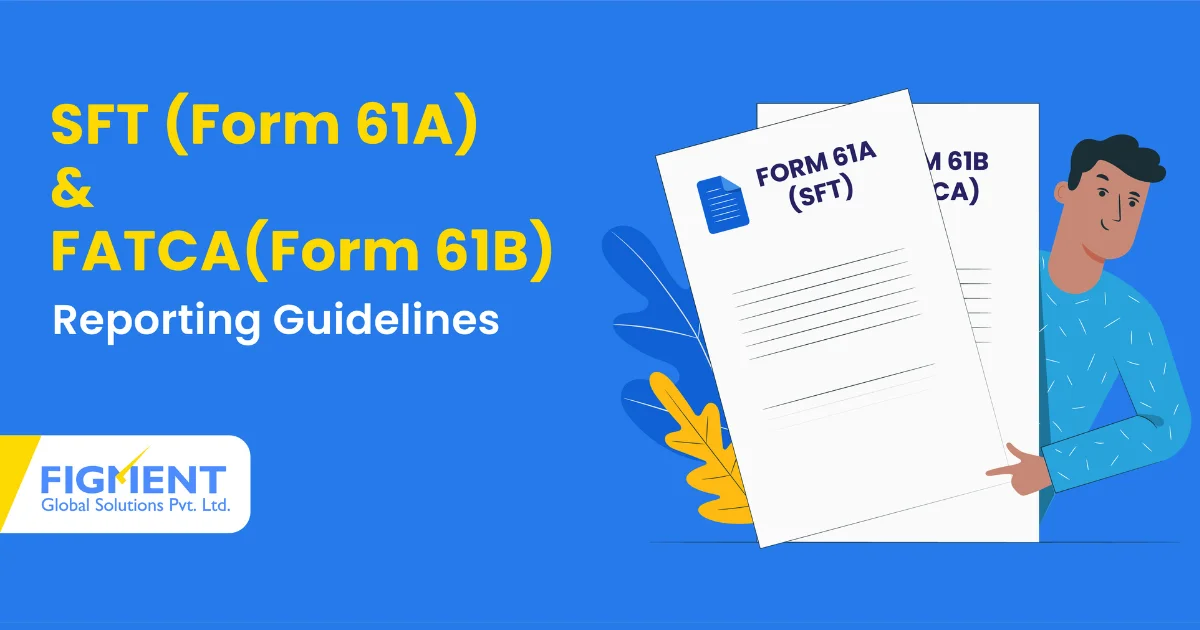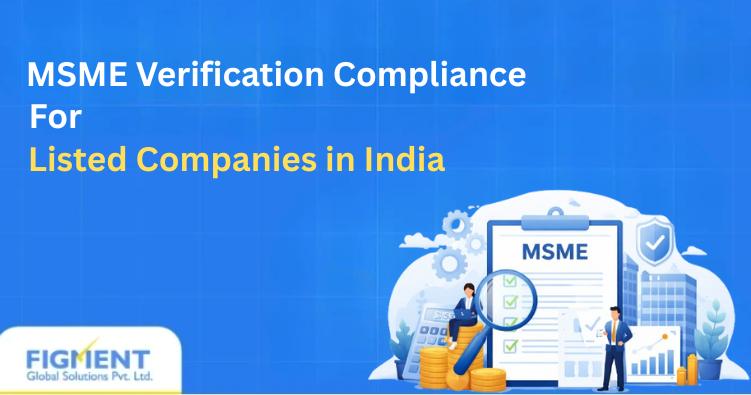Managing finances and staying compliant with the taxes can be tough in India, the Income Tax Act has various forms like Form 61, 61A, and 61B for reporting financial transactions as mandated by the Section 285BA.
What is Form 61?
Form 61 is for the people who don’t have a Permanent Account Number (PAN). If you make big transactions without a PAN, you need to give details using Form 60, which are then reported through Form 61. It must be filled for the periods 1st April to 30th September and 1st October to 31st March of each financial year.
Example: A person who wants to buy or sell a car over ₹10 lakhs and doesn’t hold a PAN then he/she has to fill Form 60 and the transaction get reported via Form 61.
Form 60 is a document to be filed by a person (not a company or firm) to carry out transactions specified in Rule 114B when they do not have a PAN either because:
- they have not applied for PAN or
- they have applied for PAN, but allotment is pending
Form 60 without applying for PAN is not acceptable if your total income (other than agriculture) is more than the basic exemption limit. In that case, you can use Form 60 only if you have applied for PAN, and must also mention the date of application and acknowledgement number in column 22 of the form.
If a minor enters into a transaction requiring a PAN, the PAN of the guardian or Form 60 may be provided.
Declaration in Form 60 can be made either offline or online. It is to be submitted to the person with whom the transaction is being entered into.
The transaction that are reportable and the value of transaction which has to report are as follows:
| S. No. | Nature of Transaction | Value of Transaction |
| 1 | Purchase or sale of any motor vehicle excluding two-wheelers | Any Value |
| 2 | Opening of Demat account | Any Value |
| 3 | Opening an account with any banking institution or bank other than a basic savings deposit account/Application to an institution bank, or company for debit or credit card | Any Value |
| 4 | Purchase or sale of an immovable property | ₹10 lakh or more |
| 5 | A fixed deposit with any bank/post office/Nidhi/non-banking financial company | more than ₹50,000 or aggregation of more than ₹5 lakh during any tax year |
| 6 | Payment to restaurants or hotels in cash against the bills | Exceeding ₹50,000 at one time |
| 7 | Payment in connection with travel to any foreign country or payment for purchase of any foreign currency in cash | Exceeding ₹50,000 at one time |
| 8 | Payment of a life insurance premium | Exceeding ₹50,000 in a year |
| 9 | Sale/purchase of company shares or contract for sale or purchase of securities | Exceeding ₹1 lakh per transaction |
| 10 | Sale or purchase of goods/services other than the above | Exceeding ₹2 lakh per transaction |
| 11 | Payment to a Mutual Fund for purchase of units | Exceeding ₹50,000 |
Documents to be submitted with Form 60
These documents serve as identity proof/address proof in the above mentioned transactions where PAN is not applied for, if PAN is applied for and allotment is pending, only the date of application would be sufficient.
- Aadhar card
- Driving License
- Passport
- Ration Card
- ID proof from an accredited institution
- Copy of the electricity bill or telephone bill
- Any document issued by Central Government, State Government or any local bodies.
- Any documentary proof related to the address mentioned in the form.
For Association of Persons (Trusts) – Copy of trust deed or certificate of registration issued by Charity Commissioner.
For Association of Persons (other than Trusts/Body of Individuals/Local authority/Artificial Juridical Person) – Copy of Agreement/copy of certificate of registration issued by Charity commissioner/Registrar of Cooperative society/any other competent authority/any other document originating from any Central or State Government Department establishing identity and address of such person.
For Hindu Undivided Family (HUF) – any document in the name of Karta of HUF is needed.
Information required to be filled in the Form
- Full address and name of the declarant
- Particulars related to the transaction for which you are filling the Form 60. For example, if the transaction is related to opening a savings account with the bank, you need to mention it in Form 60, stating the name of the bank and the transaction amount, too. If it is not applicable, then you must write N.A.
- In case you are assessed w.r.t income tax, mention the details of the range, circle or ward where you filed the last return of income.
- You must mention your reason for not having a PAN card. If you have applied for it and are yet to receive it, you must mention it in the form.
In case of any mismatch in the particulars with the supporting documents will cancel the form and requires resubmission.
What is Form 61A?
Form 61A is for banks, companies, and other entities to report significant transactions. It helps catch tax evasion.
Form 61A is further divided into statement details and report details. Part A which contains statement level information is common to all transaction types. The report level information has to be reported in one of the following parts (depending of the transaction type):
- Part B (Person Based Reporting)
- Part C (Account Based Reporting)
- Part D (Immovable Property Transaction Reporting)
Part B (Person Based Reporting)
Part B shall be used for person-based reporting which is relevant to the following transactions:
- SFT- 001: Purchase of bank drafts or pay orders in cash
- SFT- 002: Purchase of pre-paid instruments in cash
- SFT- 005: Time deposit
- SFT- 006: Payment for credit card
- SFT- 007: Purchase of debentures
- SFT- 008: Purchase of shares
- SFT- 009: Buy back of shares
- SFT- 010: Purchase of mutual fund units
- SFT- 011: Purchase of foreign currency
- SFT- 013: Cash payment for goods and services
Part C (Account Based Reporting)
Part C shall be used for account-based reporting which is relevant to the following transactions:
- SFT- 003: Cash deposit in current account
- SFT- 004: Cash deposit in account other than current account
- SFT- 014: Cash deposits during specified period (9th Nov to 30th Dec, 2016).
Part D (Immovable Property Transaction Reporting)
Part D shall be used for reporting of purchase or sale of immovable property (SFT- 012). The reportable immovable property transactions have to be determined by applying the threshold limit. The reporting person/entity is required to submit specified details of immovable property transactions which are determined as reportable.
The transaction that are reportable and the entities who has to report are as follows:
| S. No. | Nature and Value of Transaction | Who Needs to Report |
| 1 | Cash payments of ₹10 lakh or more in a year for bank drafts, pay orders, or banker’s cheques.Cash payments of ₹10 lakh or more in a year for pre-paid instruments from RBI. Cash deposits or withdrawals of ₹50 lakh or more in a year from one or more current accounts. | Banks or cooperative banks covered by the Banking Regulation Act, 1949. |
| 2 | Cash deposits of ₹10 lakh or more in a year in accounts other than current or time deposits. | Banks, cooperative banks, and the Post Master General. |
| 3 | Time deposits of ₹10 lakh or more in a year, excluding renewals of other time deposits. | Banks, cooperative banks, the Post Master General, Nidhi companies, and registered non-banking financial companies. |
| 4 | Payments for credit card bills of: ₹1 lakh or more in cash; or ₹10 lakh or more by any other method, in a year. | Banks, cooperative banks, or any company issuing credit cards. |
| 5 | Receipts of ₹10 lakh or more in a year for bonds or debentures (excluding renewals). | Companies or institutions issuing bonds or debentures. |
| 6 | Receipts of ₹10 lakh or more in a year for shares (including share application money). | Companies issuing shares. |
| 7 | Buyback of shares for ₹10 lakh or more in a year (excluding open market purchases). | Companies listed on a recognised stock exchange. |
| 8 | Receipts of ₹10 lakh or more in a year for acquiring units of mutual fund schemes (excluding transfers between schemes). | Trustees or managers of mutual funds. |
| 9 | Receipts of ₹10 lakh or more in a year from sales of foreign currency (including credits to foreign exchange cards, expenses through debit/credit cards, or other instruments). | Authorised persons under the Foreign Exchange Management Act, 1999. |
| 10 | Purchase or sale of immovable property for ₹30 lakh or more, or valued at ₹30 lakh or more by the stamp valuation authority. | Registrars or Sub-Registrars under the Registration Act, 1908. |
| 11 | Cash payments over ₹2 lakh for sales of goods or services. | Persons liable for audit under section 44AB of the Act. |
| 12 | Cash deposits from 9th Nov 2016 to 30th Dec 2016 of: ₹12.5 lakh or more in current accounts; or ₹2.5 lakh or more in other accounts. | Banks, cooperative banks, and the Post Master General. |
| 13 | Cash deposits from 1st Apr 2016 to 9th Nov 2016 in accounts reportable under Sl. No. 12. | Banks, cooperative banks, and the Post Master General. |
| 14 | Capital gains on transfer of listed securities or units of Mutual Funds | Recognised Stock Exchange Depository as defined in the Depositories Act, 1996Recognised Clearing Corporation Registrar to an issue and share transfer agent registered under the Securities and Exchange Board of India Act, 1992 |
| 15 | Dividend income | A company |
| 16 | Interest income | Banking company or co-operative bank under the Banking Regulation Act, 1949Post Master General under the Indian Post Office Act, 1898 Non-banking financial company with registration under the Reserve Bank of India Act, 1934 |
Procedure:
- Company/Financial Institutions have to register himself on the Reporting Portal.
- Prepare the data and upload it in XML format..
- Sign digitally and submit the Form.
What is Form 61B?
Form 61B ensures compliance with international tax laws like FATCA (Foreign Account Tax Compliance Act) and CRS (Common Reporting Standard). Financial institutions report accounts held by foreign residents, if no accounts has been identified pursuant to due diligence, then the reporting financial institution shall furnish a NIL statement. Form 61B is also known as the “Statement of Reportable Account”.
Example: A bank or financial institutions reports accounts held by foreign customers even if there are no such accounts, they must file a NIL report each year using Form 61B.
Information Required in Form 61B:
- Part A: Statement Information
- Reporting Entity Details (Name, ITD-REIN, GIIN if any, etc.)
- Details of the statement type, original ID of the statement, reporting period.
- Principal Officer Details
- Part B: Report Details (in respect of each Reportable Account)
- Information of the account holder (Name, Address, Tax IDs, Date and Place of birth).
- Branch details, including branch name, branch number and address.
- Account Information: Account Number, Balance/Value, Currency, etc.
- Reporting Entity Information.
- Threshold limit and Criteria for Reporting of FATCA AND CRS Reportable accounts
| FATCA-US | Pre-Existing as on 30.06.2014 | New account after 30.06.2014 |
| Criteria | Threshold Limit | Threshold Limit |
| Individual-High Value | >100000$ | >50000$ |
| Individual-Low Value | >50000$ but < 100000$ | >50000$ |
| Entity | >250000$ | No threshold |
| CRS-Other Countries | Pre-Existing as on 31.12.2015 | New account after 31.12.2015 |
| Criteria | Threshold Limit | Threshold Limit |
| Individual-High Value | >100000$ | No threshold |
| Individual-Low Value | < 100000$ | No threshold |
| Entity | >250000$ | No threshold |
Procedure:
- Company/Financial Institutions have to login himself to the E-filing Portal using ITDREIN, Authorised Person PAN, and Password.
- Prepare the data and upload after selected relevant Form type on the portal.
- File a NIL report if there are no reportable accounts.
- Click on Validate and after successful validation, upload the corresponding ZIP file, generate the Signature file using DSC Management Utility, and then upload.
Due Date of filing SFT (Form 61A & 61B)
The due date for filing SFT (Form 61A & 61B) for a particular financial year is the 31st day of May of the subsequent year. Thus, for example, if you hold reportable accounts during the financial year 2024-2025, then the due date for filing Form 61B is 31st May 2025.
Penalty on late filing of SFT
If you miss this deadline for filing the SFT, you may face a penalty of ₹500 for each day of delay and if the notice has been issued and such person fails to furnish the statement then penalty of ₹1000 for each day during the failure continues. Not filing or providing inaccurate information may also result in penalties.
Benefit of these Forms
These forms help maintain transparency:
- Form 61: Records transactions by those without a PAN.
- Form 61A: Tracks large transactions.
- Form 61B: Promoting Tax Transparency, Combating Tax Evasion, and Complies with global tax rules.
Properly managing these forms helps avoid penalties and ensures a transparent financial system.
Conclusion
Understanding and correctly using Forms 61, 61A, and 61B is important. They make sure financial transactions are transparent and compliant with tax laws, helping both individuals and institutions stay accountable.







